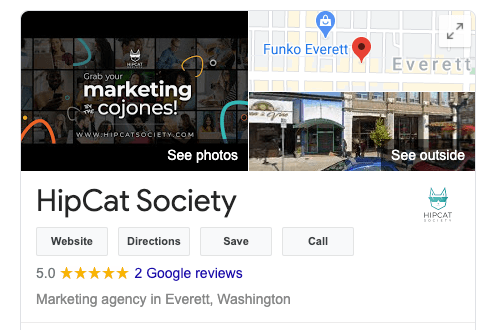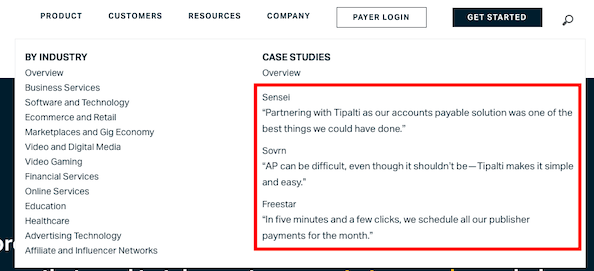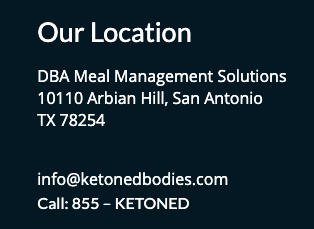How to Build an Effective Local SEO Strategy
Local SEO refers to the practice of increasing the visibility of physical locations in search results. Local SEO generates high-quality traffic and drives conversions for local businesses. It can also help you compete with big brands and stay relevant.
Local SEO is essential as customers use local search across various smart devices and mediums like voice search.
We’ll go over what local SEO is now, why it’s essential for local business, and how you can improve it. Building an effective local SEO strategy shouldn’t be that hard.
What is Local SEO?
Local SEO is the area of optimizations focused on ranking higher for searches in your local area.

One of the most overlooked things in Local SEO is acknowledging the different surfaces people can find information about your business.
People find local businesses in more places than Google Search.
The Different Surfaces to Think About in Local SEO
Of course, the most well-known is Google Search.
But even within Search, there are other Google-owned properties, including Google Maps and Knowledge Graph. These properties commonly appear across Google products, including Google Search.
And don’t forget that there are other search engines to think about: Bing, Yandex, Siri, and Alexa. Social Media platforms like Facebook, Instagram, Pinterest, and Twitter are increasingly being used as search engines.
There are also local directories like Yelp, Foursquare, and other niche websites that are used, for example, in Apple Maps.
Last but not least, there’s YouTube, which processes more than 3 billion searches a month (that’s more than Bing, Yahoo!, Ask, and AOL combined, according to Mushroom Networks).
And because YouTube is owned by Google, it’s often given its own knowledge graph in the search results – something you can use to your advantage.
For example, FreshBooks not only appears in the third organic result with its How to Make an Invoice article for that exact-match query.
It also has two YouTube videos in the video knowledge graph just below it, helping the brand dominate the SERP for this key term.

And you can’t forget about any other websites that show up about your business.

The four most important things to focus on in local SEO are:
- Google My Business
- Reviews
- On-page optimization
- Links
Let’s dive in.
1. Google My Business
Visibility of your local business across Google properties is essential and cannot be understated.
Google My Business (GMB) is a free tool Google provides for businesses to manage their online presence across Google, including Search and Maps.
Establishing a business listing through your Google My Business profile is critical in appearing across Google products. For example, the Local Pack is a SERP feature offering a map of business locations plus the listing of three relevant businesses. It appears on the front page of the SERP for any search query exhibiting local intent. It’s driven by Google My Business listings data.
Beyond that, ensuring your name, address, and phone number are consistent across all business listings is crucial.
Local Listings
GMB provides a local listing of your business online-but primarily across Google products. It’s not the only one, but it’s one of the most important.
Local business listings are vital for local business, and the crucial information for your business should be accurate across them. If you run a local business, you should be running citation audits.
And while there are a million citation tools and services out there, one of the most trusted agencies is Loganix, and they offer a complete citation audit starting from seven dollars.
If you have an older business that hasn’t done an audit before, you can expect to have many citations that need to be changed.
Many businesses forget easy wins like verifying your business, filling out your location page, adding business categories, business description, photos, and sending out updates through GMB posts. These all impact your local search results.
Google My Business Checklist
Here’s a quick list to make sure you’re on the right track with GMB:
- Sign up and get GMB verified and live
- Ensure proper Name, Address, Phone, and Website is listed
- Add hours of operation
- Add business description
- Add quality photos and videos
- Add logo and cover photo
- Add business categories
- Post updates
Read: How to Build an Effective Local SEO Strategy (Webinar Highlights)
2. Reviews
One of the most relevant things search engines and people look at when evaluating local businesses are reviews.
Platforms that host reviews are utilized across various surfaces, and it’s essential to be aware of how they impact your business.
For example, GMB reviews show up across Google Products, including Search and Maps.

For example, HipCat Society’s Google My Business listing reveals its five-star rating, as well as how many reviews that’s coming from.

Clicking through to those reviews reveals them in full, giving potential customers invaluable information that will help inform their decision.

Directories like Yelp, TripAdvisor, and Foursquare have been used across Apple products, including Spotlight, Siri, and Maps.
And in iOS 14, Apple introduced Apple Reviews to help businesses get recognized and decrease Apple’s reliance on third parties like Foursquare and Yelp.
Generating Reviews
Focusing on generating reviews across platforms your customers interact with is crucial for improving your local search engine results.
It’s never been more critical to have a process for pushing customers to give you a review on platforms that will provide you with visibility, traffic, and sales.
And marketing automation tools have made it easier than ever for businesses to ask customers to leave a review.
Through email automation or SMS campaigns, re-engaging customers after they’ve engaged with your business has become a low-hanging fruit that can do wonders for your reputation and online presence.
Collecting email addresses at the time of service leads to one of the best ways to generate reviews. Follow up with customers after a few days and ask them to write a review about their experience. Then simply thank them and link to a choice of platforms for them to publish their thoughts.
A few disclaimers to watch out for when looking at review tools:
- Don’t pay for reviews.
- Don’t have people act as customers.
- Don’t have a review kiosk. Having a single source for reviews is likely to get them flagged and removed.
- Don’t negatively review your competitors. Ethics aside, this is not permitted on most review platforms.
- Don’t ignore review platform guidelines.
Responding to reviews can be daunting, especially ones that are malicious towards your business. But you can make reviews work for you instead of against you. In responding to reviews:
- Don’t blame
- Don’t accuse
- Don’t curse
- Don’t mislead or cheat
- Don’t be long-winded
Simply make sure you:
- Apologize
- Be accountable
- Show commitment
- Be honest
- Be brief
Read: How to Create A Successful Local Content Strategy [With Examples]
Getting the Most Out of Your Reviews
A few tips to get the most out of your reviews:
- Be specific. It’s best to be specific when asking people for a review and a star rating. Don’t ask many questions. It turns it into a survey and puts many people off due to the effort involved. Make it simple – you’re requesting a favor after all.
- Make it personal. Personalize the request with the specific product or service they purchased – they may have forgotten you by the time you ask.
- Make it unique. People tend to ignore tedious, templated requests. One written from a personal, reply-able email address using your brand’s voice is far more likely to get results.
- Respond. Whether it’s a glowing review, a harmful one, or somewhat neutral, responding to every review shows that you care and allows people to trust you.
3. On-page Optimization
It’s really easy to get caught up designing, developing, and maintaining a website and forget to include critical information about your business on it.
Include Reviews
Your website is a critical platform for building trust with current and future customers. By featuring reviews and testimonials about your business, you can make your business more trustworthy.
Create a compelling review or testimonials page for your brand and ensure it’s easily accessible from your website navigation. Having a review page ranking well on brand and review searches can do wonders in building trust for potential customers.
When it comes to showcasing your reviews, follow Tipalti’s lead and feature them across several key areas of your site, such as on your homepage.

In relevant header dropdowns.

And within a dedicated Case Studies hub.

NAP
It’s crucial to include all key information on your local business, particularly your:
- Name
- Address
- Phone number
This trinity is commonly referred to as NAP.
Your website is a core place where your name, address, and phone number should all be listed. Ensuring the accuracy of on-site NAP is crucial for customers and ranking.
Google uses NAP citations to confirm correct business info. The more appearances of matching information across NAP citations, the more confident they are that the data is accurate.
Consistent NAP citations across reputable websites is a big deal, but it all starts with your own.
And the easiest way to do this is to simply include your address and contact information in your website’s footer like Ketoned Bodies.

Local Keywords and Pages
Including your keyword in your URL, using short URLs, and utilizing your keywords in the right places throughout your pages are also really low hanging fruit in SEO.
Another quick win is setting up location pages for the different areas you serve if your business operates in multiple locations.
One local strategy is to create landing pages for areas, even if your business isn’t physically in that area. This way, location pages can help you rank in local results for many different local areas.
Be sure to list all the locations you serve in your footer so users can easily navigate to the right location from any page.

Just make sure you avoid duplicate content.
Content
Other on-page optimizations can come through your content. Tools like MarketMuse make it extremely easy to find quick wins in optimizing your content.
MarketMuse has a great toolset. Alongside effortlessly giving you keyword variants, their Research and Compete functions enable you to build out local content based on topic clusters so you can quickly find everything you need about a topic to create rich content that satisfies user intent. Google’s favorite kind.
MarketMuse even has a content strategy crash course that gives you everything you need to get started.
It’s crucial not to lose sight of the long-tail. Many people want to go after the big, bottom of funnel terms and forget about the low hanging fruit.
Read: How to Do Local SEO Strategy With MarketMuse
Links
From the start of Search engines, links have been crucial in determining when and where you show up. Links are a direct ranking factor.
Link building is not just about having a large number of links to your domain. You need quality links, links from pages with expertise, authority, and trustworthiness. And a volume of quality links nested in relevant content.
Internal vs. External Links
Internal links, where you link to other pages on your site, help users navigate your website and show value towards those pages in the eyes of Google.
External links, where you link to other websites, can strengthen your authority by linking to related content, similar to how you become more authoritative by referencing sources in your content.
This is particularly important if you’re referencing statistics. It would be unnatural for you not to cite their source, so be sure to do so to keep your link profile natural in Google’s eyes.
Social Media
Links from social media platforms like Facebook or Twitter aren’t directly factored into Google as links, but they are bridges that make it more likely for people to find your business.
Local Citations
A citation in local SEO is the equivalent of a backlink. It’s a mention that could appear in an online directory or other places without having the actual backlink.
A local citation (or local listing) within a directory is another way for people to learn more about your business – part of the reason why keeping a consistent NAP is so essential.
When starting to build local citations, people usually get them live and then quickly forget about them. So all the effort of making local citations is lost.
Here’s a local SEO tip for you. Add citations to your locations page, so they get discovered, crawled, and indexed by Google. Because a potential customer is unlikely to find it if it’s not in the index.
Expertise, Authority, and Trust
You may have heard the term E-A-T before. This is a term that comes from Google in the form of the Google Search Quality Evaluator Guidelines.
In 2020, Google released a film about how search works, and in it explain:
The Search Quality Evaluator Guidelines are a 168-page document establishing what makes a good Search result good. We’re talking about websites exhibiting expertise, authoritativeness, and trustworthiness… Want your website to show up higher in Search? Read the guidelines– seriously.
Websites exhibiting expertise, authoritativeness, and trustworthiness. E-A-T.
One of the largest factors in trustworthiness is consistency. And Google particularly cares about consistency in your name, address, and phone number, as those are the most important bits of information people want on businesses.
So while you’re focusing on building out more links from directory citations, it’s crucial to ensure your business information remains consistent.
Summary
Many people think Local SEO is just Google Search and Google my Business. It’s crucial not to overlook the different surfaces people can find information about your local business.
Effective Search engine optimization for local ranking focuses on:
- Google My Business
- Reviews
- On-page optimization
- Links
Keeping in touch with the different areas your customers interact with and ensuring your business information is always correct goes a long way in optimizing your local SEO.
This post was written by Adam Steele, Founder and COO at Loganix, an SEO fulfillment partner for agencies and marketers. They build easy to use SEO services that help businesses scale. If you liked this article, visit their blog for more SEO guides and articles.
Stephen leads the content strategy blog for MarketMuse, an AI-powered Content Intelligence and Strategy Platform. You can connect with him on social or his personal blog.

